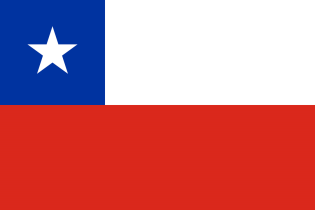Republic of Chile: Difference between revisions
mNo edit summary |
mNo edit summary |
||
| (3 intermediate revisions by 2 users not shown) | |||
| Line 7: | Line 7: | ||
12 February 1818 | 12 February 1818 | ||
*Treaty of Recognition | *Treaty of Recognition | ||
25 April 1844|other-names=República de Chile (Spanish)|demonyms=Chilean}} | 25 April 1844|other-names=República de Chile (Spanish)|demonyms=Chilean|roundel=[[File:ChileRoundel.png|center|90px]]|classification=[[Regional Power]]|lon-status=* [[League of Nations|Member State]]|memberships=* [[Union of South American States]]}} | ||
'''Chile''', | '''T'''he '''Republic of Chile''', commonly known as '''Chile''', is a [[Legacy Nation]] located in the intersection of the [[Amazonia Cluster]] and [[Argentine Arm]]. It is a [[Regional Power]], a member of the [[Union of South American States]] and [[League of Nations]]. | ||
== History == | == History == | ||
Latest revision as of 02:50, 26 June 2025
The Republic of Chile, commonly known as Chile, is a Legacy Nation located in the intersection of the Amazonia Cluster and Argentine Arm. It is a Regional Power, a member of the Union of South American States and League of Nations.
History
Pre-First Scinfaxi War
Evidence of human occupation of the area that would become Chile on Earth dated back to at least 16,000 BCE - with settlements as early as 8,000 BCE. From 1438 to 1533 CE, much of what was northern Chile became part of the Incan Empire. Spain conquered and colonized the region in the mid-16th century, replacing Inca rule, but failed to conquer the autonomous tribal Mapuche people who inhabited what was once south-central Chile. Chile emerged as a relatively stable authoritarian republic in the 1830s after their 1818 declaration of independence from Spain. During the 19th century, Chile experienced significant economic and territorial growth, putting an end to Mapuche resistance in the 1880s and gaining its current northern territory in the War of the Pacific (1879–83) by defeating Peru and Bolivia. In the 20th century, Chile underwent a process of democratization and experienced rapid population growth and urbanization, while relying increasingly on exports from copper mining to support its economy.

